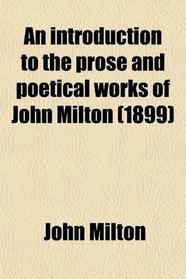Search -
An introduction to the prose and poetical works of John Milton (1899)
An introduction to the prose and poetical works of John Milton - 1899
Author:
Purchase of this book includes free trial access to www.million-books.com where you can read more than a million books for free. This is an OCR edition with typos. Excerpt from book: yet our Pegasus raises himself on very tender pinions. Let us be lowly wise ! I have by continuous reading brought down the affairs of the Greeks as far as th... more »
Author:
Purchase of this book includes free trial access to www.million-books.com where you can read more than a million books for free. This is an OCR edition with typos. Excerpt from book: yet our Pegasus raises himself on very tender pinions. Let us be lowly wise ! I have by continuous reading brought down the affairs of the Greeks as far as th... more »
ISBN-13: 9780217775328
ISBN-10: 0217775322
Publication Date: 8/17/2009
Pages: 242
Rating: ?
ISBN-10: 0217775322
Publication Date: 8/17/2009
Pages: 242
Rating: ?
0 stars, based on 0 rating
Publisher: General Books LLC
Book Type: Paperback
Other Versions: Hardcover
Members Wishing: 0
Reviews: Amazon | Write a Review
Book Type: Paperback
Other Versions: Hardcover
Members Wishing: 0
Reviews: Amazon | Write a Review
Genres:




